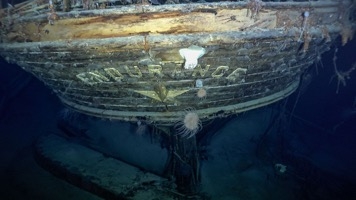A Letter from the NPSI President
Finding Endurance
The legendary ship Endurance was found more than a century after sinking in Antarctic waters. The famed polar explorer Ernest Shackleton's ship, which sank in 1915, was located in the Weddell Sea off the coast of Antarctica on March 9, 2022. Intrigued for years by Shackleton’s leadership qualities, I’ve been reflecting on the importance of endurance, fortitude, flexibility, and hope for us in these times.
It has been two years and six months since our lives were thrown off our (familiar) course because of the COVID-19 pandemic. Some of us have survived. Others have not. Businesses around us have closed. We’ve been uprooted from our in-person practices and gatherings and have had to gain technical knowledge to help us navigate a virtual world, whether we wanted to or not. Despite challenges and our hemming and hawing, we have worked to hold the analytic frame for online psychoanalysis, psychoanalytic training, and scientific meetings.
It isn’t just the pandemic and the fallout from it that challenges us, but many other dramas as well. Russia invaded Ukraine, and the U.S. supports Ukraine financially while avoiding going to war with Russia. We wrestle with decisions by the U.S. Supreme Court on women’s issues and on environmental protection. The violence in society catches up with us as we feel the tension between holding space for listening to different voices and the need for more action-oriented social activism. The NPSI Board of Directors voted to acknowledge the indigenous peoples on whose land we live and work and the need for an anti-racist statement on our website. There is much cause for consternation in the great swirl unfolding politically. In this climate we strive to keep our hearts and minds open and continue listening to one another and to our patients.
Against this backdrop, NPSI strides on. We have completed another academic year. One group of candidates have completed their didactic courses and we have accepted another group to begin training in September. Several senior candidates are diligently working on their graduation papers which we look forward to hearing presented at their graduation ceremony. We have had two psychoanalysts join us as Full Members: Joanne della Penta and Danny Gellersen. And two of our long-time members, Oscar Romero and Kenneth King, have retired from clinical practice and become Emeritus members.
We are once again sponsoring our International Evolving British Object Relations Conference this fall online, which is new for us. The conference theme is ‘Truth and Lies’. Bion observes that truth is to the mind what food is to the body. When emotional truth cannot be faced, meaning is lost. In our pre-EBOR Scientific Meetings, we gathered online to discuss truth and lies, striving to make sense of the world we live in and in our consulting rooms. What is the patient’s experience of the world? What alienates patients from their own experience? What defenses and lies keep them (and us) from relating authentically? As we investigate these questions, we discover others who share our curiosity like people warming around a fire. Gathering in this way, we gain strength which sustains us to do the analytic work we love.
In my NPSI graduation paper, I likened Earnest Shackleton’s 1914 advertisement for crew members to journey with him to the South Pole to the practice of psychoanalysis. His advertisement read, "Men wanted for hazardous journey. Low wages, bitter cold, long hours of complete darkness. Safe return doubtful. Honour and recognition in event of success." Shackleton left England aboard the Endurance with a crew of 27 bound for a bay on the Weddell Sea meant to be the starting point for an attempt to be the first to cross Antarctica. Shackleton never made it to the pole. And his boat sank. Still, his leadership in keeping all of his crew alive, including an 800-mile open-boat journey across the treacherous Southern Ocean to the island of South Georgia, made him a hero at home in England.
Reading of the Endurance’s discovery, I find myself again inspired by the human spirit. For Shackleton to risk voyage, he must have unconsciously felt “a seeking system” of the sort Panksepp refers to in his seven primary-process emotional systems. NPSI colleagues have much in common with these early explorers as we daily engage in unpredictable circumstances with those who desire something more from life. These ‘co-explorers’ are individuals willing to risk big for the hope of discovering their essential being. To risk the analytic journey and the challenges inherent in growing, both analyst and analysand must learn to tolerate frustration and withstand emotional reality even when it hurts or devastates us.
Shackleton had the ability to recognize when conditions changed, allowing him to shift his goals and move forward. Like him, NPSI must adjust to changing environmental conditions if we expect to survive and thrive as an IPA component Society and Institute. Acknowledgment that risk coexists with each step forward is an essential truth.
I am glad to be on this voyage with all of you. I hope you too find your endurance and that your creativity finds expression as you journey toward increased consciousness.
Sincerely,
Barbara Sewell, MaMFC, MDIV, MRE, MIPA


